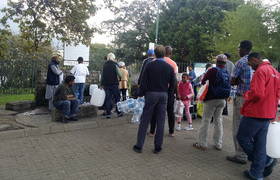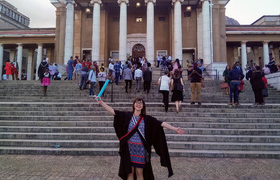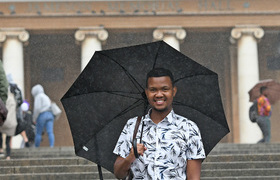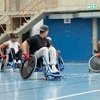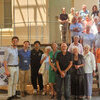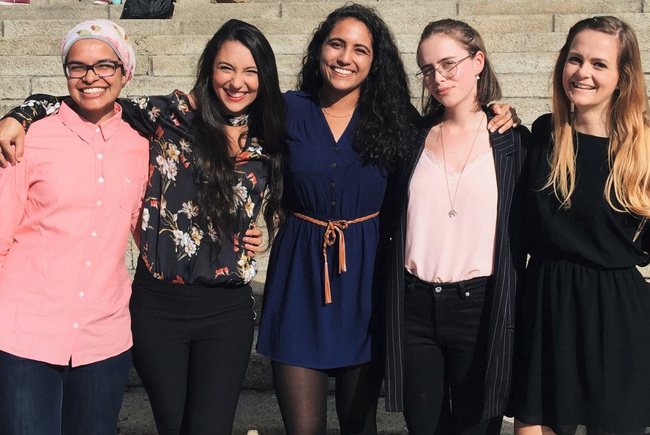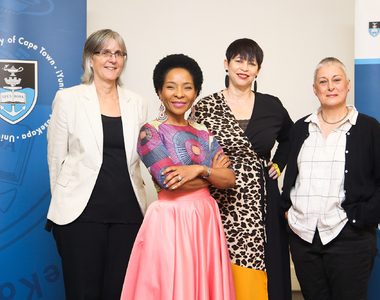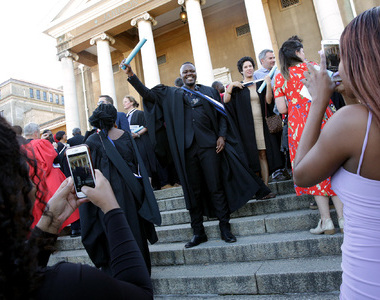‘Wunderkind’ Manono speeds through his PhD
08 July 2019 | Story Carla Bernardo. Photo Je’nine May. Read time 10 min.
Malibongwe Manono is a wunderkind. On 12 July 2019, at the age of 31, he will graduate from the University of Cape Town (UCT) with his PhD in chemical engineering. But it’s the short time it took, and the challenges he overcame along the way, that make this achievement particularly inspiring.
Manono completed his doctorate in just three and a half years, while simultaneously juggling his teaching responsibilities in the department, and after navigating a winding and often bumpy road in the lead-up to this accomplishment.
His journey began in Khayelitsha, where he spent his early years before leaving for his grandmotherʼs home in Willowvale in the Eastern Cape. Under her careful and encouraging watch, he completed grades 3 to 9 before returning to Khayelitsha to finish his last three years at Joe Slovo Engineering High School.
He had already developed a love for mathematics and the physical sciences. He watched the Learning Channel, went over old study guides and became interested in engineering. But his high school only offered mathematics and physical science on standard grade.
Determined to pursue his interests and push himself, Manono began studying the two subjects on higher grade, teaching himself outside of the classroom. He was also fortunate to have a teacher, Mnoneleli Mananga, who recognised his potential and introduced him to the Scientific and Industrial Leadership Initiative’s (SAILI) Saturday classes.
With sheer determination, clear goals and a support network – ingredients crucial to his later success as well – Manono finished Grade 11 as his school’s top learner in both subjects, and matriculated with 93% for physical science and 87% for mathematics, both on higher grade.
He again sought counsel from Mananga when it came to choosing his tertiary path. His teacher advised him to apply for UCT and pursue a BSc.Eng in chemical engineering. Manono listened.
Fresh out of high school, he was initially enrolled in the Faculty of Engineering & the Built Environmentʼs Academic Support Programme for Engineering in Cape Town (ASPECT). But just a few days into Orientation Week, he decided he was ready for the mainstream programme. He made his case to the then-head of department, Professor Eric van Steen, and was successful.
But the journey ahead would be no easy ride.
Bumps in the road
Manono was used to being the top achiever, but at university, in his first semester, he was lost.
“I think the gap between matric and first year was just too much … The first semester was hell.”
“I think the gap between matric and first year was just too much,” he said.
“The first semester was hell …”
He took some time during the mid-year break to reflect on his performance, and decided to recommit himself to his studies and to his goal of completing his degree.
“When I came back, I was on fire … I was chowing those courses.”
He was indeed on fire: He completed his first year on the Dean’s Merit List and was rewarded with a scholarship for his second year, which was another high and saw him closely missing out on a repeat place on the Dean’s Merit List.
But then in his third year, the budding engineer hit another bump.
His health deteriorated – so much so that his lecture attendance dropped below 50%. Inevitably, this affected his academic performance. In fourth year, he continued to struggle with low energy and a loss of momentum.
But somehow, he prevailed, finishing his five-year undergraduate programme with six months to spare.
And then he was dealt yet another blow.
One of the terms of his scholarship was that upon completion of his degree, there would be a job for him at the donor company. However, an economic downturn meant he found himself jobless.
Fortunately, the Centre for Minerals Research’s Associate Professor Kirsten Corin – who later became Manono’s PhD supervisor – offered him a part-time job in a lab. Things were beginning to look up again and in August 2010, he registered for a two-year master’s degree, which he completed within a year.
Offers and losses
After graduating, he felt it was time to gain experience – and earn some extra money – in the field. He joined ArcelorMittal in Saldanha Bay as a candidate engineer in 2011. Two years later, he was formally appointed as an engineer and moved to their Vanderbijlpark plant.
But the itch for academia returned so he applied for a teaching job in the Department of Metallurgical Engineering at the Vaal University of Technology (VUT). In 2015, with the support and encouragement of his head of department, Manono enrolled for his PhD.
He enjoyed his time at VUT, teaching and completing much of the groundwork for his PhD. But then he received an enticing offer: a chance to teach and complete his PhD at his alma mater, UCT.
“I never got a chance to tell [my father] I got an offer from UCT.”
He knew he wanted the job, but it would mean taking a risk: He would be leaving a permanent position for a contract post. So, Manono decided to consult his primary support network, his family.
UCT made its offer on 24 March 2016, the day before he flew to Cape Town to celebrate Easter with his family. It was a trying time as Manono’s father had suffered a stroke and was in hospital. The family was also still coming to terms with the death of their grandmother who passed away in 2014.
Manono visited his father in the hospital, but he was too ill to speak and slept throughout the visit. Sharing the news about UCT’s offer would have to wait.
Sadly, his father died that night.
“I never got a chance to tell him I got an offer from UCT... ,” Manono said.
Support networks
Suffice to say, he chose UCT. And in just three and a half years – while juggling his roles as lecturer and supervisor to a number of postgraduate students – he finished his PhD, which examines water quality in froth flotation. As if that victory is not sweet enough, by the time he graduates on Friday, Manono will be almost two weeks into his new role in the Department of Chemical Engineering: as permanent senior lecturer.
It’s an incredible achievement at the end of a bumpy, winding road. Getting there required many sacrifices, sheer determination, clear goals and a support network second to none, he said.
From the start, he was fortunate to have friends with experience at university on whom he could lean for advice. It was a network that balanced his family’s support.
Being the first Manono to attend university meant he couldn’t necessarily ask for help about tutorials or course material. But his family gave him critical guidance and backing in the form of prayer, family meal times and almost-daily church services.
Support also came from his PhD supervisors, Corin and Jenny Wiese.
“They ... had an open-door policy,” said Manono.
“I think I have lived out my curiosity. I’ve done that which I wanted to do.”
Although he was a part-time student, they treated him as if he was studying full-time, including him in all the research group meetings, guiding him and pushing him to constantly innovate.
But as much as they pushed him, they also made sure he stopped when the time was right.
“There is a time where, with the help of your supervisors, someone says to you, ‘I think now is enough, you can hand in’.” He had, with the help of his supervisors, managed to answer the questions he had when embarking on his PhD.
“I think I have lived out my curiosity,” he said.
“I’ve done that which I wanted to do.”
Sacrifices and goals
Manono said the journey to obtaining his PhD has humbled him and taught him that he can conquer amid challenges. But to do so, there must be a commitment to goals and a realisation that there will be sacrifices.
There were many sleepless nights and even more late ones. When he wasn’t burning the midnight oil, he would join his family in front of the TV. But even while enjoying some downtime, he was always accompanied by his laptop, typing away, drawing graphs and analysing data.
“Literally, that was my life.”
But foregoing recreational activities wasn’t really a sacrifice for Manono. Instead, he saw it as a conscious decision to use his time effectively, to achieve his goal.
Steps like dedicating a minimum of two hours a day to his PhD and finding spaces at UCT where he could work on his research alongside other doctoral candidates were key to making it all come together.
Nevertheless, it was sometimes overwhelming. In those moments of doubt, he reminded himself that this was his goal: He wanted it, he knew he was capable and that it was possible.
“I think you can overcome anything... as long as you set yourself a goal to achieve,” he said.
Manono is not resting on his laurels. After graduation, he will continue supporting undergraduates and postgraduates, pursuing research and putting in the work necessary to become an associate professor in a few years. But, while he chips away at his academic goals, he has a new area he’ll be conquering – hitting the gym and getting fit.
 This work is licensed under a Creative Commons Attribution-NoDerivatives 4.0 International License.
This work is licensed under a Creative Commons Attribution-NoDerivatives 4.0 International License.
Please view the republishing articles page for more information.
Highlights from 2019
As we look back on 2019, we celebrate the top 40 stories that were most popular with readers of the UCT News website during the year.







